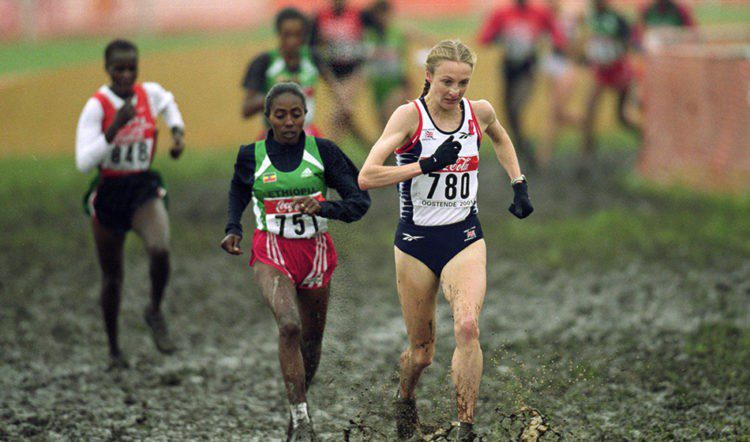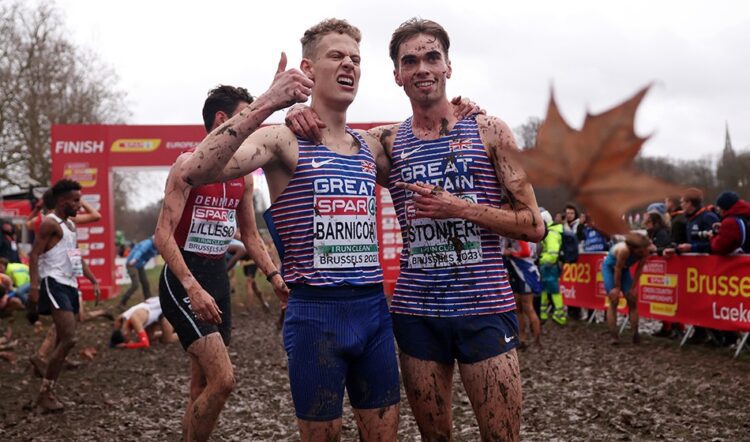[ad_1]
An increasing number of event cancellations are an insult to the very essence of a sport that prides itself on gritting it out in tough conditions
The European Cross Country Championships in Brussels reminded everyone about the joys of running off-road. Parc de Laeken turned into a mudlark’s paradise on Sunday with the ground churning up progressively as the day unfolded. It is what traditionalists call “real cross-country racing”.
Appearances can be deceptive, though. Children’s races that were due to take place before the European Championship events suffered a last-minute cancellation due to rainfall on the eve of the meeting. The organisers of these EnergyVision CrossCup races said they “couldn’t guarantee the safety of the kids running on the course”.
This is not a one-off either. The culture of cross-country cancellations is spreading through the sport at an alarming rate.
In the UK there was uproar on Saturday when the South of England Inter-Counties and Masters Championships at Horspath near Oxford was called off when the under-13 girls in the first race were standing on the start line. Athletes had travelled from as far afield as Jersey and Cornwall, with some booking overnight stays in hotels, only to be told of an “unsafe course” that meant the races couldn’t go ahead, although some runners decided to run the course anyway.
The South of England organisers added: “The referee decided to cancel because the first aid cover SEAA had arranged couldn’t, on the day, be provided to the majority of the course. Those who ran the course did so at their own risk as a training run.”
George Gandy, the renowned distance running coach, would turn in his grave. “I didn’t think the word ‘cancel’ was part of a cross-country enthusiast’s vocabulary,” he once told AW.

Pic: Mark Shearman
This follows the cancellation of the London Youth Games at Parliament Hill in north London last month. On hearing the news, distance running legend Dave Bedford accused current cross-country organisers of “having lost their way” following what he calls an “inexplicable cancellation”.
He added: “I fear we have stealthily ushered in an era where the default position is to cancel, rather than go ahead. Youngsters of this generation are often unfairly characterised as ‘snowflakes’. Yet it is perhaps the older administrators who have lost their way, making decisions that deprive youngsters of the chance to compete. It risks undermining our nation’s ability to get the younger generation fit and enjoying the mental and physical benefits that outdoor competitive sports bring.”
In its defence, the London Youth Games said: “For more experienced athletes with the right equipment the course would have been runnable. However, we pride ourselves on this event drawing many young people from many different backgrounds. Therefore, for some this would not have been a safe or enjoyable experience in the forecasted deteriorating conditions we were faced with.”

Paula Radcliffe battles through the Ostend mud in 2001 (Getty)
Earlier this winter Storm Babet led to the North of England Cross-Country Relay Championship at Graves Park in Sheffield and the British Masters Cross-Country Relays at Long Eaton in Nottinghamshire being among a number of events called off. These are unlikely to be the only events that bite the dust this winter either.
Old-school cross-country runners will confirm such cancellations have become far more commonplace in the last decade or so. All of which begs the question, are today’s cross-country organisers soft or sensible?
At this point you can probably guess where I stand – with Gandy and Bedford. Cross-country running is a winter sport, after all, and as we saw so gloriously in Brussels on Sunday, difficult conditions and muddy ground is a large part of its appeal.

Will Barnicoat and Matt Stonier (Getty)
Great Britain topped the medals table in style in Brussels. But if domestic cross-country cancellations continue then don’t be surprised to see the kings and queens of Europe one day lose their crown.
When it comes to the rot setting in, I believe it can be traced back to the British Universities and Colleges (BUCS) Cross Country Championships in February 2009. The event was held in Aberdeen but was called off the day beforehand due to snowfall.
Many of the teams were already on their way to the Scottish venue, though, in mini-buses and coaches at great expense. In an act of defiance, students arrived in Aberdeen anyway and around 240 of the original 1000-strong entries staged their own unofficial championships on the course.

AW February 2009
The headline on AW’s front cover that week was “Snow joke” alongside a photo of Andy Vernon who, along with Lauren Heyes, ended up as the “winners”. Not surprisingly, there were no major injuries or casualties either apart from some bruises from snowball fights.
A disgusted Gandy, who was in charge of a Loughborough University team that had spent an estimated £7000 on travel and accommodation, said: “I can’t recall any other senior event at national level being called off in over 50 years’ involvement in the sport – though foot-and-mouth threatened it – and I have certainly experienced plenty of snow, slush, ice, gales, floods, fog and transport challenges in that time.”
Gandy, who died in 2020, added: “My impression was that course readjustments or venue switches were considered but that the word ‘cancel’ was not previously part of a cross-country enthusiast’s vocabulary.”
Indeed, go back several generations and cross-country runners routinely had to run through streams, climb over fences and even crawl through barbed wire.

Old school cross-country runners clamber under barbed wire
Later that year the English Schools Cross-Country Cup in Alnwick was also called off due to snow. However, eight years later the English Schools Athletics Association redeemed itself by going ahead with their national cross-country championships in Leeds despite the “Mini Beast from the East” blowing Polar continental air across the UK.
On that latter occasion, athletes woke up to a stirring message from the English Schools organisers on social media, which read: “The weather forecast is brr… with strong winds bringing maybe about 20mm of snow… perhaps… no more. This is normal cross country weather in England and the Championships will go ahead as planned.
“This is your chance to decry the increasing perception that kids nowadays are ‘snowflakes’! Turn up. Run. Get cold. Get muddy. Enjoy getting warm again! This is proper cross-country weather.”
The rallying cry was met with almost universal approval and teenage runners who braved the Arctic conditions that day included Keely Hodgkinson, who was runner-up to Ella McNiven in the inter girls’ race before going on to win Olympic 800m silver three years later.

Muddy marvels (Mike Fleet)
Youngsters who ran in that bitingly-cold 2018 English Schools Championships are unlikely to forget the experience. In addition to Hodgkinson, those in action included Matt Stonier, Zak Mahamed, Rory Leonard, Khai Mhlanga, Henry McLuckie and Abbie Ives.
Sadly, too many events are called off, though. There was anger and frustration in 2013, for instance, when the historic South of England Cross-Country Championships at Parliament Hill was called off by the City of London Corporation and the SEAA a full five days before it was due to take place due to “icy ground, slippery conditions in the coach park and fears the ground would be damaged”.
In the same week, though, the Cardiff Cross Challenge went ahead in snowy conditions. Race organiser Graham Finlayson told AW he was determined to put the event on “and it was all part of the fun and challenge of cross-country”.

Cardiff Cross Challenge 2013
Similarly, while last weekend’s South of England Inter-Counties near Oxford was called off, the North East Counties Championships at South Shields went ahead despite particularly boggy ground.
Where there’s a will, there’s a way. While Finlayson and, clearly, officials from the North East Counties are refreshingly old school, however, too many organisers are calling events off due to bad weather. Often it is not simply because the course is water-logged or “dangerous” either, but sometimes it is simply down to road and rail transport disruption, problems with the car parking, or complaints from landowners that the ground will get churned up.
Challenging conditions yesterday at the @NECAAathletics #XC Championships in Temple Park, South Shields.
Credit to both the competitors and officials for putting on a great event.#mudisgood #crosscountryrunning #fastrunning pic.twitter.com/PnfKBikEga
— Stuart Whitman (@stuartwhitman_) December 10, 2023
Long before the term ‘health and safety’ even existed, Tim Johnston won the South of England cross-country title in 1963 and memorably said: “It started to snow heavily on Boxing Day 1962, then froze hard and snow stayed on the ground in depths varying from a few inches to drifts of several feet all through January and February until a slow thaw set in in early March, making the National on Coldham’s Common one of the wettest. muddiest ever.
“All outdoor sport was cancelled with the exception of cross country. which thrived as never before. and we all became stars overnight. as there was nothing else to fill up the sports pages.”
With global warming a reality, we are likely to see more extreme weather in the winter, which will threaten an increasing number of cross-country races. The message to nervous organisers is that young athletes are tougher than we imagine.
As for landowners worried about the ground being cut up? The grass will grow back and the memories of a fantastic cross-country race can last forever.

AW’s Jason Henderson (left) at the 2013 English National in Sunderland
» Read our coverage of the European Cross Country Championships here
» Receive our Christmas 2023 offer here
[ad_2]
Source link


